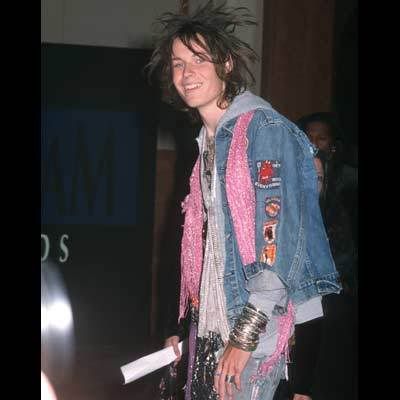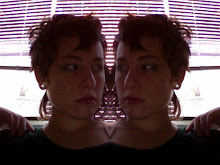
Welcome to my blog! I decided maybe this wasn't such a bad idea, and that one-time somewhat famous MTV Wanna Be A VJ (1998) winner Jesse Camp (born Josiah Jesse Holden Camp III...) was something like a humanoid chupacabra. Chupacabras are legendary cryptids that suck the blood of goats and are popular in Mexican and Puerto Rican myth.
I just came back from Israel and I will be studying social movements in Mexico next semester in San Cristobal, Oventic, Tlaxcala, Juarez, and Mexico City. I promise future postings will be shorter.
A few bits from a longer reaction:
"Most of my trip focused on helping an Ethiopian Jewish community in Netanya, just north of Tel Aviv, working on “schpackling” and painting exteriors of apartment buildings in a low-income neighborhood and doing art projects with the cutest children in the world at their youth center. My Hebrew is very limited, so when the kids would ask if I knew Tupac or Chris Brown, I knew enough to say “Ken....sababa!” (Yes....cool!). I drew them lizards and tied balloons, but mostly stayed quiet. It didn't really matter that we couldn't understand each other, I still felt connected to the Ethiopian youth in the way I helped them sculpt doves out of clay or make frogs out of cardboard.
Just like so many other Jews of the world, Ethiopians immigrated to Israel through the Law of Return, which allows Jewish people to attain citizenship and make their lives in the holy land. My trip was comprised of about 40 students from schools around NY including CUNY & SUNY schools, Columbia, and NYU. We represented a mixed demographic of Jewish and cultural identities, spanning from secular Jews to the more Orthodox. The trip was based in the concept of “tzedek” (justice) and “tikkun olam” (repairing the world). We also spent time at a food and clothing shelter in Karmiel near the Sea of Galilee and visited a Druze community in Beit Jan. I could tell you about painting in the cold or sifting through piles of old shoes, but it would not mean much without context.
If no one told me that there was a situation happening in Gaza, I would not have known. Northern Israel reminds me of The Sound of Music; it's rolling hills fall into neat rows of farmland, the sea sparkles, the sun always seems to be shining. I was incredibly fortunate to experience these places, but it meant more that I was helping people through a Jewish lens, no matter who the people were. The clothing shelter in Beit Jan supports those in need regardless of religious, racial, or cultural identity. Jewish values teach us to be compassionate, and Israel's obligations as described in their Proclamation of Independence state that “...it will ensure complete equality of social and political rights to all its inhabitants irrespective of religion, race, or sex; it will guarantee freedom of religion, conscience, language, education and culture; it will safeguard the Holy Places of all religions...We extend our hand to all neighboring states and their peoples in an offer of peace and good neighborliness, and appeal to them to establish bonds of cooperation and mutual help with the sovereign Jewish people settled in its own land...”.
Israel's own proclamation allows us to question and think critically about the recent events within Israel and Palestine. The most vital lesson any of us can grasp, regardless of our own opinions on the conflict, is what it means to have compassion for others. I firmly believe that context controls the reception of our empathy, or even how we define an enemy. History sets the framework, showing the link between me and the Ethiopians in Netanya, but also how Islam and Judaism both have legitimate roots in the same land.
I love the land of Israel, but my love is not limited to my Jewish connectivity with the people and history. It is impossible for me to perceive Israel simply as the Jewish state. I value the integration of cultures: tasting Arab pastries, Yemenite cuisine, admiring the way Arabic, Hebrew, and English each have their own presence, lingering in the air like the spice of the perfect falafel, remaining on my lips even after the last bite."
"The image of the enemy is a moral and political burden because you are negotiating with someone whom only yesterday you called an oppressor, a murderer or a terrorist. You promised your followers that this person would be severely punished as a reward for the oppression they had lived through. Your followers, meanwhile, are telling you justice requires punishment. They ask: 'How can you negotiate and talk to a person who is responsible for all the disasters of our people?'...I am negotiating because I have chosen the logic of peace and abandoned the logic of war. This means my enemy of yesterday must become my partner. He may still be my opponent but he is an opponent within peace, not within war."
-- Adam Michnik, Polish activist
Avi Shlaim: How Israel Brought Gaza to the brink of humanitarian catastrophe
“Oxford professor of international relations Avi Shlaim served in the Israeli army and has never questioned the state's legitimacy. But its merciless assault on Gaza has led him to devastating conclusions”
http://www.notesforpeace.org/
“Notes for Peace is a non-profit organization that aims to bring Jewish and Arab youth together through music and art education initiatives in order to promote tolerance, understanding, and mutual respect.”
http://www.theparentscircle.com/
“The Parents Circle Families Forum (PCFF) for Peace, Reconciliation and Tolerance...[promoting] reconciliation -- as an alternative to fear, hatred and revenge...'it won’t be over until we talk'.”
http://www.btselem.org/English/
B'tselem: The Israeli Information Center for Human Rights in the Occupied Territories
http://www.combatantsforpeace.org/
Combatants For Peace: “We are a group of Israeli and Palestinian individuals who were actively involved in the cycle of violence in our area. The Israelis served as combat soldiers in the Israel Defense Forces and the Palestinians were involved in acts of violence in the name of Palestinian liberation. Only by joining forces will we be able to end the cycle of violence”
Youtube video about Ethiopian immigration and Cafe Shachor Chazak (Strong Black Coffee), an Ethiopian Jewish rap group based out of Netanya:

hey, I just added this to my feed
ReplyDelete